|
|
|
Sort Order |
|
|
|
Items / Page
|
|
|
|
|
|
|
| Srl | Item |
| 1 |
ID:
105923
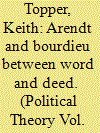

|
|
|
|
|
| Publication |
2011.
|
| Summary/Abstract |
This essay investigates questions about the relationship between language, speech, and democratic institutions by bringing into conversation Hannah Arendt's and Pierre Bourdieu's distinctive views of the politics of language and speech. First, I explicate Arendt's account of the connection between speech, action, and identity disclosure, as well as its role in her broad conception of political institutions. Next, I complicate this outlook by examining Bourdieu's political sociology of language, focusing on the ways that linguistic competences valorized in particular institutional settings operate as mechanisms of silencing, domination, and exclusion. Finally, I bring these approaches together by investigating political events-AIDS activism in the United States during the 1980s and early 1990s-that raise critical issues regarding the politics of language and speech within a specific institutional setting. By reading Arendt and Bourdieu together in the context of these events, one can develop a defensible account of the politics of speech in democratic theory and practice.
|
|
|
|
|
|
|
|
|
|
|
|
|
|
|
|
| 2 |
ID:
156539
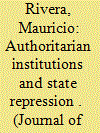

|
|
|
|
|
| Summary/Abstract |
Existing research has paid increasing attention to the role of political institutions such as legislatures and opposition parties in autocracies. So far, however, the relationship between nondemocratic institutions and state repression has remained largely unclear. This article argues that authoritarian institutions are related to divergent conflicting dynamics between incumbent regimes and opposition actors, which provide leaders with opposite incentives to repress. While authoritarian legislatures enhance leaders’ capacity to prevent conflict and reduce their need for repression, the presence of opposition parties helps opposition actors to overcome collective action barriers and mobilize against the incumbent regime, increasing the states’ need for repression. A panel data analysis of nondemocracies from 1976 to 2007 shows that authoritarian-elected legislatures reduce repression and the presence of opposition parties increases it. Moreover, the results indicate that autocracies with opposition parties and an elected legislature experience lower repression than autocracies with opposition parties but no elected legislature.
|
|
|
|
|
|
|
|
|
|
|
|
|
|
|
|
| 3 |
ID:
115622
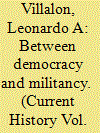

|
|
|
|
|
| Publication |
2012.
|
| Summary/Abstract |
The effort to try to distinguish between good and bad Muslim ideologies may be much less important than the need to support functional political institutions.
|
|
|
|
|
|
|
|
|
|
|
|
|
|
|
|
| 4 |
ID:
087560
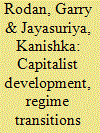

|
|
|
|
|
| Publication |
2009.
|
| Summary/Abstract |
The possibility of viable alternatives to the historical combination of liberal democracy and capitalist development is now widely acknowledged in the analysis of late industrializing countries. For example, within the transitions literature notions of hybrid regimes and closer scrutiny of institutional functioning are being employed to capture complex variations in authoritarianism. Less acknowledged is the significance of capitalist dynamics and related geopolitics for the character and performance of political institutions. We argue that late industrialization in Asia has especially militated against middle-class/labor alliances and produced a general fragmentation of social forces restricting the scope for democratic coalitions. But as well as helping to explain the consolidation and refashioning of existing authoritarian regimes, analysis of these social foundations of political institutions also helps account for strands of authoritarianism within so-called post-authoritarian polities. The Pacific Review has long fostered debate about the durability or otherwise of authoritarian regimes and alternative models to Western capitalism in Asia.
|
|
|
|
|
|
|
|
|
|
|
|
|
|
|
|
| 5 |
ID:
096294
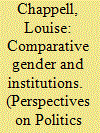

|
|
|
|
|
| Publication |
2010.
|
| Summary/Abstract |
A comparative politics of gender offers an opportunity to consider in detail the operation of gender within political institutions. As such, it contributes to a deeper understanding of the roles and experiences of men and women within political institutions, of the policies, laws and norms that are the outcomes of these institutions, and of the relationship between these institutions and social actors. This essay proposes a multi-directional strategy for undertaking comparative gender and institutional research that includes taking account of similarities and differences within and across states, between states and international institutions, across space as well as across time. It argues that through this research strategy it is possible to gain a more nuanced understanding of gender processes and outcomes, which is valuable to those working both inside and outside political institutions to advance a women's equality agenda.
|
|
|
|
|
|
|
|
|
|
|
|
|
|
|
|
| 6 |
ID:
192054
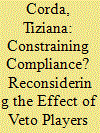

|
|
|
|
|
| Summary/Abstract |
What effect do domestic political and institutional constraints such as veto players have on the success of international sanctions which their countries have been subjected to? Do they facilitate or constrain compliance with them? Although in the literature on sanctions success the role of domestic factors has received extensive attention, a typically public-policy concept such as veto players has remained largely underexplored. The potential of its application to the literature on sanctions was only recently uncovered by sanction scholars who found empirical support for the hypothesis that the larger the size of veto players in a country under sanctions, the higher the probability of compliance. Contrary to their findings, this article theorises a negative causal mechanism whereby a growing divergence in the relevant policy-area preferences of veto players prevents the targeted country from complying with sanctions-related demands. An empirical reassessment of this relationship with George Tsebelis’ original policy-area-specific veto player data confirms this negative effect.
|
|
|
|
|
|
|
|
|
|
|
|
|
|
|
|
| 7 |
ID:
129087
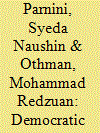

|
|
|
|
|
| Publication |
2014.
|
| Summary/Abstract |
In recent years efforts have been made to improve governance by ensuring institutional performance and policing for greater transparency to sustain liberal democracy in Bangladesh and elsewhere. Since gaining independence in 1971, The People's Republic of Bangladesh has been driven by internal power struggles and economic chaos, while attempting to develop a democratic society. A predominately Islamic country, Bangladesh's representative government is battling poverty and rampant corruption. Although this study appreciates what Bangladesh has achieved so far, it seeks to deviate from the general trend that romanticizes Bangladesh's democracy and its recent connection with new governance parameters. This study attempts to identify some of the major paradoxes that Bangladesh's democracy is faced with. All these factors will be analyzed in the context of a contemporary notion of governance and democracy in Bangladesh.
|
|
|
|
|
|
|
|
|
|
|
|
|
|
|
|
| 8 |
ID:
153600
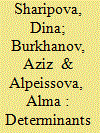

|
|
|
|
|
| Summary/Abstract |
This article investigates the determinants of ethnic and civic nationalism in post-Soviet Kazakhstan. Using data from an original nation-wide survey (N = 1600), the regression analysis is applied to evaluate the influence of trust and perceptions of discrimination as well as sociodemographic factors on people's support of civic and ethnic nationalism(s) in Kazakhstan. The results show that trust in political institutions, perceived discrimination, and the knowledge of the Kazakh language have an impact on both types of nationalism. In addition, intragroup (ethnic) trust and income determine civic–nationalist attachments, while rural residence, Kazakh ethnicity, income, and other ethnic minorities influence ethnonationalism in Kazakhstan.
|
|
|
|
|
|
|
|
|
|
|
|
|
|
|
|
| 9 |
ID:
095586
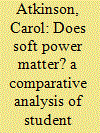

|
|
|
|
|
| Publication |
2010.
|
| Summary/Abstract |
Democratic governance depends not only on the building of democratic institutions but also on citizens' knowledge about how these institutions should function in their everyday lives. I argue that US-hosted educational exchange programs are one mechanism whereby citizens of nondemocratic states might experience life firsthand in a democratic country. Their experiences may impact the political institutions and influence political behavior in their home countries. In order for this process to take place, I argue that at least three contextual conditions are important: (i) the depth and extent of social interactions that occur while abroad, (ii) the sharing of a sense of community or common identity between participants and their hosts, and (iii) the attainment of a politically influential position by the exchange participant when they return home. In this article, I test these hypotheses and find support for what advocates of soft power often contend: US-hosted exchange programs can play an important role in the diffusion of liberal values and practices across the borders of authoritarian states.
|
|
|
|
|
|
|
|
|
|
|
|
|
|
|
|
| 10 |
ID:
163445
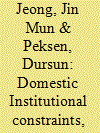

|
|
|
|
|
| Summary/Abstract |
What effect do the domestic institutional constraints in target states have on sanction outcomes? Other than the narrow focus on political regime type, little is known about how the institutional makeup of target states might affect leaders’ ability to adjust their policies to defy sanctions. We assert that the size of veto players in targets is a crucial yet overlooked institutional factor in explaining sanction effectiveness. We contend that political leaders subject to the approval of multiple veto players are more likely to concede as they are less likely to develop polices to counter the sanctions. We assess the empirical merits of our theoretical claims by combining data on sanctions from the Threat and Imposition of Economic Sanctions data set with the veto points data from the Political Constraints data set. Results from the data analysis for the 1946 to 2005 period indicate that the size of veto players is a significant predictor of sanction success even when we control for political regime type and other major political and economic covariates of sanction effectiveness.
|
|
|
|
|
|
|
|
|
|
|
|
|
|
|
|
| 11 |
ID:
123616
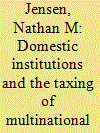

|
|
|
|
|
| Publication |
2013.
|
| Summary/Abstract |
Political scientists have examined how domestic politics and the competition for international capital affect the setting of national tax rates. In this paper, I explore how political institutions, specifically the level of democracy, affect firm-level taxation across the world. I argue that electoral competition leads democratic governments to higher levels of taxation on firms. Using a data set on firm tax payments on the foreign affiliates of US multinational corporations from the US Bureau of Economic Analysis, I show that there are large variations within countries on the tax burdens faced by firms that are not explained by national tax rates. I find evidence that the mobility of the specific investment project, the types of spillovers these investments provide to a community, and attributes of the parent firm are all important determinants of taxation. While firm-level factors clearly affect corporate taxation, I argue that democratic institutions limit the offering of tax incentives and generate electoral benefits to policing tax avoidance by multinational corporations. After controlling for parent firm and foreign affiliate-level factors, I find that democratic countries generate as much as 26% more tax revenues from multinational corporations relative to authoritarian countries.
|
|
|
|
|
|
|
|
|
|
|
|
|
|
|
|
| 12 |
ID:
129992
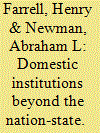

|
|
|
|
|
| Publication |
2014.
|
| Summary/Abstract |
What is the relationship between domestic and international politics in a world of economic interdependence? This article discusses and organizes an emerging body of scholarship, which the authors label the new interdependence approach, addressing how transnational interactions shape domestic institutions and global politics in a world of economic interdependence. This literature makes three important contributions. First, it examines how domestic institutions affect the ability of political actors to construct the rules and norms governing interdependent relations and thus present a source of asymmetric power. Second, it explores how interdependence alters domestic political institutions through processes of diffusion, transgovernmental coordination, and extraterritorial application and in turn how it changes the national institutions mediating internal debates on globalization. Third, it studies the shifting boundaries of political contestation through which substate actors affect decision making in foreign jurisdictions. Given the importance of institutional change to the new interdependence agenda, the authors suggest several instances where historical institutionalist tools might be exploited to address these transnational dynamics, in particular, mechanisms of cross-national sequencing and change strategies of substate actors. As globalization continues, it will be ever more difficult to examine national trajectories of institutional change in isolation from each other. Equally, it will be difficult to understand international institutions without paying attention to the ways in which they both transform and are transformed by domestic institutional politics. While the new interdependence approach does not yet cohere as a single voice, the authors believe that it offers an innovative agenda that holds tremendous promise for both comparative and international relations research as it calls on scholars to reconsider the dynamic nature of globalization for global politics.
|
|
|
|
|
|
|
|
|
|
|
|
|
|
|
|
| 13 |
ID:
131387
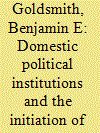

|
|
|
|
|
| Publication |
2014.
|
| Summary/Abstract |
There is doubt about whether the 'democratic peace' proposition applies in Asia. I theoretically deconstruct regime type into institutional components including political competition, constraint on the executive, and mass participation, and ask whether taking these as distinct causal factors gives more empirical purchase on the relationship of domestic political institutions to states' external conflict behavior. I find that higher levels of political competition are associated with a lower likelihood of conflict initiation, but only when the potential target is relatively democratic. Thus, my directed-dyad analysis is consistent with a democratic peace effect in East Asia. It is also suggestive regarding the observed 'East Asian peace' that has existed since 1979, because levels of political competition have risen considerably in the region, beginning in the late 1970s.
|
|
|
|
|
|
|
|
|
|
|
|
|
|
|
|
| 14 |
ID:
169319
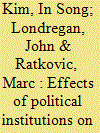

|
|
|
|
|
| Summary/Abstract |
We present a model of political networks that integrates both the choice of trade partners (the extensive margin) and trade volumes (the intensive margin). Our model predicts that regimes secure in their survival, including democracies as well as some consolidated authoritarian regimes, will trade more on the extensive margin than vulnerable autocracies, which will block trade in products that would expand interpersonal contact among their citizens. We apply a two-stage Bayesian LASSO estimator to detailed measures of institutional features and highly disaggregated product-level trade data encompassing 131 countries over a half century. Consistent with our model, we find that (a) political institutions matter for the extensive margin of trade but not for the intensive margin and (b) the effects of political institutions on the extensive margin of trade vary across products, falling most heavily on those goods that involve extensive interpersonal contact.
|
|
|
|
|
|
|
|
|
|
|
|
|
|
|
|
| 15 |
ID:
094988
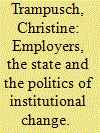

|
|
|
|
|
| Publication |
2010.
|
| Summary/Abstract |
An in-depth comparison of Austria, Germany and Switzerland shows that the employers' constellation and the elites of the public education administration affect patterns of institutional change. If large firms are the dominant actors and collaborate with elites in the public education administration, institutional change follows a transformative pattern. If small and medium-sized firms are in a strong position and have the power to influence public elites according to their interests, self-preserving institutional change results. The article also shows that it is not so much trade unions as small and medium-sized firms that act as a brake on transformative change. The article adds to the literature of institutional change by arguing that specifying and explaining patterns of institutional change requires that sufficient scope be allowed for actors' creative handling of institutions. It also suggests that in order to differentiate between self-preserving and transformative change, one has to specify the important institutional dimensions that sustain an institution. The article combines Mill's method of agreement and difference.
|
|
|
|
|
|
|
|
|
|
|
|
|
|
|
|
| 16 |
ID:
120750


|
|
|
|
|
| Publication |
2013.
|
| Summary/Abstract |
As political trust literature has focused on its political and economical determinants, the linkage between ethnicity and trust in domestic and international institutions has been largely overlooked with a few notable exceptions. This study aims to underline this linkage and offer several hypotheses to test them in Turkish context. Using the European Social Survey conducted in 2008, this study finds that, though Kurds have low levels of trust in domestic institutions, their distrust is not uniform across all institutions. Second, it finds that Kurds are pro-international institutions; that is, compared to Turks, they hold higher trust in international institutions. Finally, it finds that, contrary to the studies on the winner/loser debate in long-standing democracies, winners in general and Kurdish winners, those who voted for the Justice and Development Party, the winning party in the 2007 election-are not distinguishable in their level of trust in political institutions from the rest of society.
|
|
|
|
|
|
|
|
|
|
|
|
|
|
|
|
| 17 |
ID:
112511
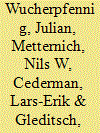

|
|
|
|
|
| Publication |
2012.
|
| Summary/Abstract |
Previous research has focused primarily on how ethnicity may trigger civil war, and its effect on conflict duration remains disputed. Rather than treating conflict as a direct consequence of ethnic cleavages, the authors argue that ethnicity per se does not affect civil war duration. Instead, its effect depends on its relationship to political institutions. They employ a dyadic approach that emphasizes the political context in which both government leaders and nonstate challengers can capitalize on the ascriptive nature of ethnicity. They show that although states can initially benefit from politicizing ethnic relations, once violent conflict breaks out, such policies may backfire on the government and make it difficult for incumbent governments to accept settlements that could terminate conflicts. Past policies of ethnic exclusion also benefit rebel organizations fighting the government, since the resulting grievances increase collective group solidarity and render individual fighters more cost tolerant. Using a new data set that codes the nexus between rebel organizations and ethnic groups, as well as information on ethnopolitical exclusion, the authors find considerable support for their propositions.
|
|
|
|
|
|
|
|
|
|
|
|
|
|
|
|
| 18 |
ID:
171203


|
|
|
|
|
| Summary/Abstract |
What explains the passage of Thailand's landmark universal healthcare (UHC) policy? In separate contributions, Selway and Harris emphasized the role of electoral rules and political parties, on one hand, and “professional movements” of developmentally minded state bureaucrats on the other. Which is correct? In this article, Selway and Harris respond to each other's work. While Selway agrees that the actions of the professional movement constitute an underappreciated necessary condition for universal healthcare in Thailand, he argues that Harris overstates the role of the movement in implementation. Harris defends his position and maintains that an institution-focused account is insufficient, arguing that the actions of Thailand's Rural Doctors’ Movement not only explain universal healthcare but also gave rise to the very electoral rule changes that Selway argues were so critical to facilitating universal coverage. Selway responds to these criticisms, and the two researchers jointly consider implications for causation, qualitative research, and policymaking theory.
|
|
|
|
|
|
|
|
|
|
|
|
|
|
|
|
| 19 |
ID:
131063
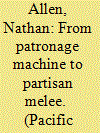

|
|
|
|
|
| Publication |
2014.
|
| Summary/Abstract |
The party system in Indonesia has expanded in the post-Suharto era. With each successive election, voters have spread their support across a wider array of parties. This has occurred despite deliberate institutional tweaks designed to consolidate the system by privileging large parties. Why has the party system expanded despite increasing institutional incentives to consolidate? This article places party system change in a broader context of decentralization and corruption. The decentralization and deconcentration of political power has opened multiple avenues for voters and elites to access state resources. Whereas major parties were expected to dominate resources in the immediate aftermath of the transition, changes to the formal and informal institutions eroded their control over the state. This has caused previously consolidated subnational party systems to fracture. The argument is demonstrated using narrative and newly constructed cross-district datasets. The paper develops the concept of rent opportunities, defined as the ability to access and abuse state resources. Party system expansion has been greatest in areas with high rent opportunities, where both voters and elites are Social Media Presidential Election Indonesia 2014 Indonesiaparticularly motivated by the competition for state resources. In these areas, characterized by large state sectors, the formerly authoritarian party (Golkar) initially won large electoral victories due, in part, to its control over patronage. As Golkar lost its ability to monopolize resources, the party system fractured. Voting for small parties surged and the party machine was replaced by a partisan melee. My argument exposes the limits of institutional engineering and underlines the formative role corruption has had on the evolution of Indonesia's party system.
|
|
|
|
|
|
|
|
|
|
|
|
|
|
|
|
| 20 |
ID:
137385
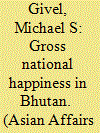

|
|
|
|
|
| Summary/Abstract |
This policy essay examines the historical and policy evolution in Bhutan from the creation of Bhutan in the 1600s to 2014. An examination of the overarching policy intent of Gross National Happiness is reviewed as well as how modern political institutions in Bhutan implement Gross National Happiness. In the 17th and 18th centuries, the new Bhutanese state founded by the Shabrung Ngawang Namgyal established its political and institutional right and legitimacy to rule based on Mahayana Buddhism canonical tenets, including ensuring that Bhutanese citizens could obtain Enlightenment and happiness. A modern manifestation of this historical precedent for state and political institutional intervention to promote collective happiness is embodied in the policy of Gross National Happiness. This essay concludes by noting that modern Gross National Happiness is a holistic development approach based on a trend emanating from more ancient Mahayana Buddhist traditions Gross National Happiness balanced with modern economic, governmental, and social conditions with Mahayana Buddhist spiritual requirements embodied in Gross National Happiness.
|
|
|
|
|
|
|
|
|
|
|
|
|
|
|
|
|
|
|
|
|